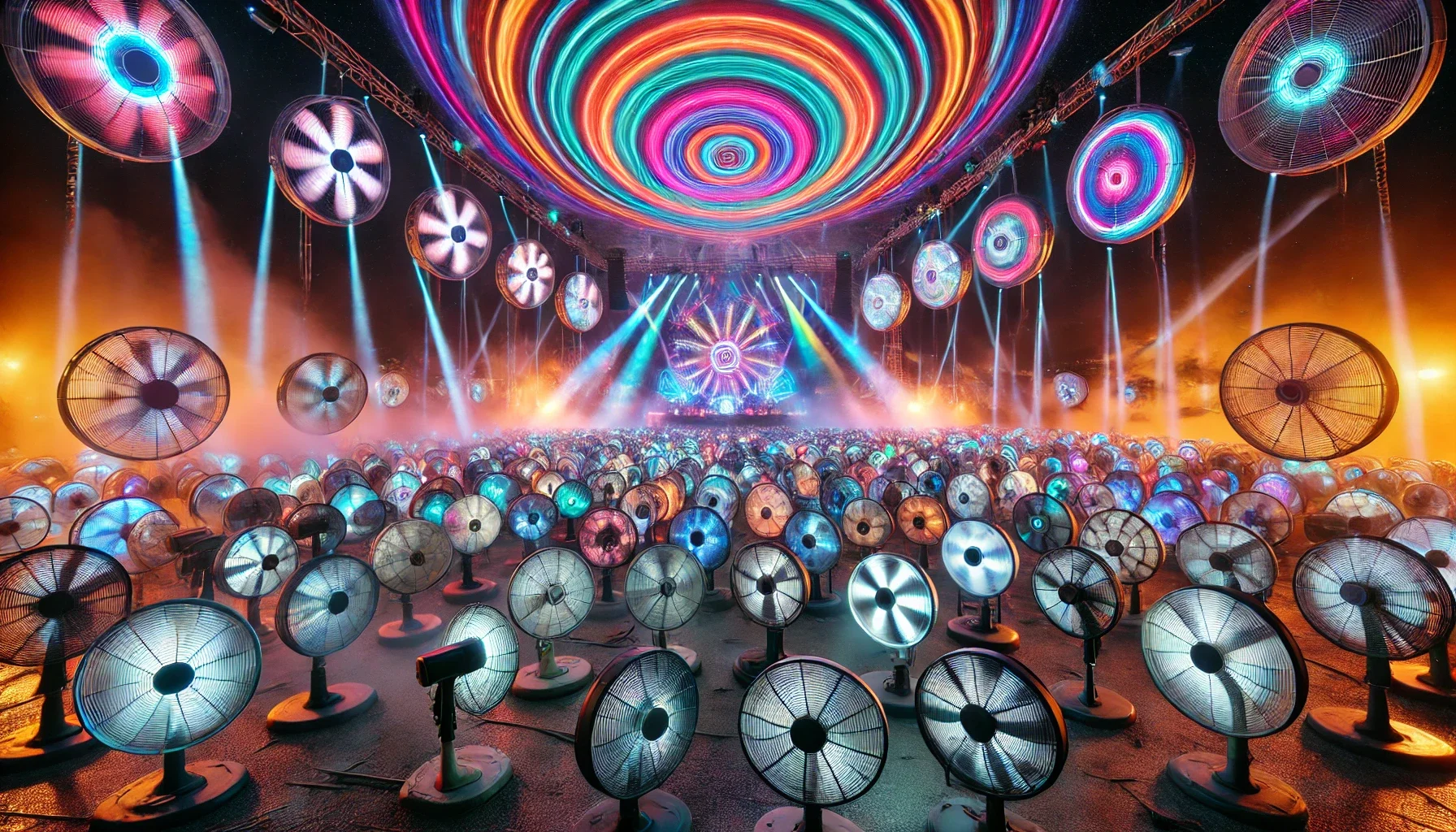How Live Nation Hijacked EDM: The $17B Festival Monopoly Fans Can’t Escape
EDM isn’t just music—it’s a product, sold through a machine. Live Nation built that machine. From Creamfields to EDC Vegas, they’re the puppeteers of lineups, the gatekeepers to stages and the silent shareholders in your favorite artist’s brand. Here’s how they metastasized power—and why both DJs and fans should be alarmed.
How Live Nation Built the Festival Machine That Owns the Music, the Artists, and You
EDM isn’t just music—it’s a product, sold through a machine. Live Nation built that machine. From Creamfields to EDC Vegas, they’re the puppeteers of lineups, the gatekeepers to stages and the silent shareholders in your favorite artist’s brand. Here’s how they metastasized power—and why both DJs and fans should be alarmed.
The Deep Dive: Live Nation & EDM
Live Nation doesn’t just control festivals. They control the idea of what a music experience is supposed to feel like. And they’ve been building this monopoly for decades—right under our bright-eyed and bushy-tailed raving noses.
History & Evolution: From Promoter to Puppetmaster
1996–2005: Born as SFX Entertainment under Robert F.X. Sillerman, whose Wall Street wet dream was to consolidate independent promoters into one mega entity.
2006–2012: Bought House of Blues, Creamfields, and HARD Events—the EDM foothold was in full effect.
2010: The Live Nation + Ticketmaster merger became official. Welcome to total vertical integration: venues, tickets, artists, data—everything.
2013–Present: Strategic “partnerships” like Insomniac cemented Live Nation’s control over the entire EDM lifecycle.
This wasn’t an expansion. It was a corporate occupation.
The Live Nation Music Control Web: Festivals, Venues, and Artists
Venues:
Live Nation owns or holds exclusive booking rights to 338–377 venues globally like the Fillmore SF, Ziggo Dome, 3Arena, Hollywood Palladium, House of Blues, and every amphitheater your mom posts throwback photos from. If your artist is touring, they’re likely passing through Live Nation’s owned gates.
Festivals:
EDC, Creamfields, HARD Summer, Bonnaroo, Lollapalooza, Reading & Leeds, Isle of Wight, Rock in Rio, BottleRock, and need I carry on? What looks like diversity is actually centralized programming behind one curtain.
Artists:
So, Live Nation manages or contracts 400+ artists, with 90+ managers in-house. The high-profile “360 deals” (U2, Madonna, Jay-Z) are just the tip of what they control.
Fans:
Well, the own the data of 100M+ fans and do whatever they shall please with it. That’s not good for us, artists, or music.
In EDM? Artists often sign away touring, merch, and even branding rights just to get a fucking time slot. A “worthy” time slot at EDC could cost you your name, your sound, your rights, and your soul.
The Monopolized Money Machine
Revenue Source - 2023 Earnings
Concerts $13.5 Billion
Ticketing (Ticketmaster) $2.5 Billion
Sponsorship/Ads $1.1 Billion
Total $17.6 Billion+
Live Nation doesn’t just make money on the music. They make money on everything surrounding it—including you.
They’ve Got You Down to a Science
Live Nation doesn’t just own the shows. They’ve mapped your behavior, your psychology, and your spending triggers.
RFID wristbands track where you are, what you buy, who you watch, when you leave.
Dynamic ticket pricing spikes your FOMO into submission.
App push notifications are timed to your exact dopamine window.
Pre-sales, VIP tiers, early access, wristband-only perks—all designed to activate reward centers in your brain.
We could go as far as saying Live Nation doesn’t sell tickets - they sell dopamine hits. They prey on scarcity, status, and speed. Flash sales. Waitlists. “Only 4 VIP Sky Decks left!” It’s psychological warfare disguised as a presale link.
Your wristband isn’t just a pass—it’s a tracker. Your favorite set? Data point. That text alert pushing the next DJ drop? Algorithmically timed.
They’ve studied us. FOMO. Nostalgia. PLUR. Our desire to feel like we belong, that the rave is still counterculture, that this show will be the one that changes our life. And, it probably will… but, they’ll bill you for it in six different ways AND sell your data. Live Nation is not your friend.
But… the Music Still Slaps. Right?
Yes. This is the wild part: the music always has been and always will be great. The artists? Mostly still real. Still trying to push creative boundaries. Still hungry. But they’re boxed in.
If they want a mainstage slot, they likely had to:
Give up creative control
Avoid certain indie promoters
Align with the “Live Nation-approved” narrative
They’re not sellouts. They’re survivors. In a system that treats music like merch and art like ad space, some artists are just trying to stay afloat and live the “average life”, which is completely okay.
The Absurdity We Keep Buying—Because It’s Still Worth It
We know the 20-30% service fee is criminal. We know the merch is overpriced. We know we’re being watched, tracked, nudged, and profiled. But we pay anyway.
Because it’s still magic. Because being at a show still feels like church. Because dancing at 2AM reaching for those laser beams still reminds us we’re alive. Because no algorithm can replace that one drop that probably makes you cry.
So we go. We pay. We participate—even when we know the system is rigged.
Not because we’re blind. But because we deserve the joy, even when it's been commercialized.
Fan Impact: You’re Not Just the Audience—You’re the Asset
Average ticket base price: $40
Final checkout after fees and “upgrades”: $120–$300+
You’re the product, and they’re reselling you to sponsors, advertisers, brands.
Discovery is no longer organic. You’re being funneled to who they want you to hear.
And all your emotion? Captured, sold, retargeted.
fyi: Antitrust Warnings and Regulatory Heat
DOJ lawsuits and UK investigations are probing monopoly behavior.
Live Nation insists it’s about “fan experience,” not vertical domination.
Meanwhile, competitors can’t compete, artists can’t breathe, and fans can’t afford.
So What Do We Do?
This isn’t a call to cancel live music. It’s not even a call to cancel Live Nation cause shit don’t work like that I am sure you all know. It’s a call to take back our music narrative and to call Live Nation UP to do better.
For artists:
Avoid 360 traps
Retain ownership
Decentralize your booking power
For fans:
Support indie promoters
Demand transparency
Take off your RFID wristband after the fest
Talk about this. Loudly. Online. In real life.
Let’s be clear: Live Nation isn’t the only problem
CTS Eventim, Superstruct, AEG, and a swarm of smaller “independent” players are doing the same thing—just wearing different logos.
Same consolidation tactics. Same festival takeovers. Same shady surveillance and data deals. And here’s the real kicker: they often share the same shareholders.
This means your so-called “choice” between fests or ticketing platforms? It’s basically an illusion. A different mask on the same face. A different checkout screen with the same payout destination.
So whether it’s a Superstruct-owned “boutique fest” or an AEG-run amphitheater tour, the profits still funnel up to the same institutional investors who’ve never danced a day in their lives.
The house always wins. Unless we start calling it out—by name.
Final Takeaway
Live Nation didn’t just build a music empire. They engineered an entertainment matrix. A corporate funnel disguised as culture. A monopoly that sells rebellion. A machine that profits off your passion.
But passion is still ours, too. There’s more of us than them. So… TALK ABOUT IT. Demand changes. Tweet at them. LinkedIn this shit. Get on TikTok and rant (heyo that’s coming soon). Get on YouTube and explain your experience. Fuck it, write a blog like it’s 2001. I’ll help.
Cause… the shareholders, well, they own the internet and things can oddly disappear, information can be changed without us noticing, the news section is oddly populated with only big news sources, there’s these funny changes here with the US internet (more later), and it… IS ALL RIGGED.
So, we fucking talk on social media — the platform given to us by these geniuses where anomalies happen suddenly and social media users are quicker than the software engineering team. Use it. A lot. Who cares if you post a lot. Just vent about it like we did on Facebook a long time ago.
Be loud. Be weird. Be free. ✌️


